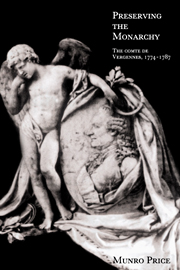Book contents
- Frontmatter
- Contents
- Acknowledgements
- List of abbreviations
- Introduction
- 1 Recalled to life
- 2 The question of reform: Turgot, Necker, and Vergennes
- 3 Vergennes as first minister: the comité des finances
- 4 The fall of the comité des finances
- 5 The politics of judicial reform
- 6 The politics of retrenchment, 1783–1785
- 7 The ministry, its divisions, and the parlement of Paris, 1785–1786
- 8 The Dutch imbroglio
- 9 Death and posterity
- Bibliography
- Index
Introduction
Published online by Cambridge University Press: 31 October 2009
- Frontmatter
- Contents
- Acknowledgements
- List of abbreviations
- Introduction
- 1 Recalled to life
- 2 The question of reform: Turgot, Necker, and Vergennes
- 3 Vergennes as first minister: the comité des finances
- 4 The fall of the comité des finances
- 5 The politics of judicial reform
- 6 The politics of retrenchment, 1783–1785
- 7 The ministry, its divisions, and the parlement of Paris, 1785–1786
- 8 The Dutch imbroglio
- 9 Death and posterity
- Bibliography
- Index
Summary
Charles Gravier, comte de Vergennes, was one of the great foreign ministers of the eighteenth century, and this aspect of his career has been much studied by historians. Yet his diplomatic career is only part of the story. For most of the 1780s Vergennes was also virtually a first minister: in embryo between 1781 and 1783, and supreme from February to November 1783. At the end of that year he was almost hounded from office, but was politically resurgent from 1785 until his death early in 1787. Vergennes' domestic role is a fascinating subject in itself. The fact that his ministérial coincided with such a crucial period of European history, however, provides insights into a wider and even more compelling theme: that of the French monarchy at the moment of its fall.
The part Vergennes played outside foreign affairs has largely been forgotten. This is partly attributable to the character of the man himself. Vergennes was a master of self-effacement whose chief expertise lay in covering his tracks: it has been all too easy to overlook what a contemporary once termed ‘le crédit caché de cet obscur ministre’. In addition, post-1920s historiographical trends have shifted attention away from the high politics of the late eighteenth century towards its social and economic aspects. The result has been a remarkable contrast between the early 1900s, which saw the publication of many important works and sources on the late ancien régime, and more recent years. A trickle of biographies of individual ministers has continued, but there has been little attempt to use these to present a coherent picture of the reign of Louis XVI as a whole.
- Type
- Chapter
- Information
- Preserving the MonarchyThe Comte de Vergennes 1774–1787, pp. 1 - 4Publisher: Cambridge University PressPrint publication year: 1995

